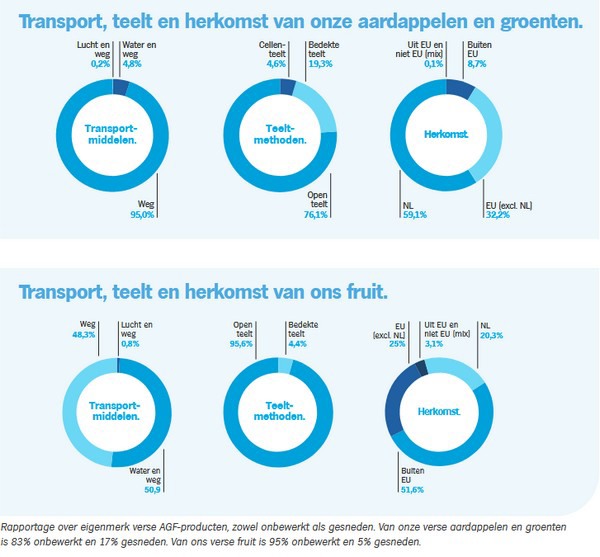Supermarket chain Albert Heijn is eager to collaborate with suppliers to advance towards more sustainable production practices. This initiative particularly focuses on reducing energy consumption, a challenging feat within the greenhouse horticulture sector, as acknowledged by AH in its 2023 Sustainability Report, which also unveils plans for 2024.
One such plan involves reducing gas consumption per product, a goal not exclusive to greenhouse horticulture but also pertinent to bakers, for instance, whose ovens cannot heat up without fuel.
The report states, "Growers using heated greenhouses are heavily reliant on natural gas. We are also mindful of other challenges, such as grid congestion, limited availability of geothermal energy in certain regions, and the fact that alternatives like hydrogen are not yet fully viable. The government also has a role to play, for example, in supporting farmers and growers' transition to fossil-free greenhouse horticulture."
Tomatoes from Morocco or the Netherlands?
In implementing measures to reduce emissions, Albert Heijn faces 'certain dilemmas,' as shared under the aforementioned heading in the report. "It may happen that a particular choice positively impacts one area of emission but negatively affects another."
In other words, swapping the heated cultivation in the Netherlands for cultivations abroad, which come with its own set of issues, is not necessarily more sustainable. Although not explicitly mentioned in the report regarding tomato imports, aspects like water usage or the use of pesticides are not discussed. However, we read:
"We ideally source our fresh products from as close as possible and as far as necessary. Yet, making this choice is not always straightforward. Sometimes, the environmental impact is lower when we grow our tomatoes under the Moroccan sun and then transport them to the Netherlands, compared to growing tomatoes in a gas-heated greenhouse in the Netherlands."
The discussion then extends to emissions per mode of transportation, notably significant in the ornamental horticulture sector. In 2023, AH ceased the air transport of unprocessed fruits and vegetables, saving over 24,000 tons of CO2 equivalents annually. Moreover, more flowers are now being shipped by sea from Kenya to the Netherlands instead of by air.
In a pilot with one of AH's suppliers, the supermarket chain is testing the quality of flowers transported to the Netherlands by sea freight. This delicate process requires precise control of temperature and humidity.

Communicating the CO2 footprint per product
Over 400 vegetable and fruit growers are part of AH's Better for Nature & Farmer initiative, where the supermarket chain collaborates to address biodiversity and climate, among the many topics. Since 2021, AH has been requesting climate data from farmers and growers within the Better for Nature & Farmer programs. They annually provide information about their operations, enabling AH to calculate the CO2 footprint of their products. This information is validated by an independent agency.
AH claims to have a 'very clear picture' of the emissions from chicken, eggs, pork, dairy, and cheese. For the fruit and vegetable category, this information will follow in 2024, starting from week 20. The supermarket chain promises to start indicating the CO2 emissions on its own-brand products and in recipes in 2024. "In this way, we aim to inform our customers about the CO2-e emissions or an estimate thereof."
Exactly how this will be implemented for fruits and vegetables is still a question for AH itself, admits Head of Quality & Sustainability Anita Scholte op Reimer at Groenten & Fruit. The differences between growers, with or without, for example, geothermal energy, are significant. Sometimes, several growers supply loose to a product group. AH will use its own calculation of CO2 scores, not adopting the Horti Footprint that the greenhouse horticulture sector itself is working on. The AH calculation is based on the Greenhouse Gas Protocol.
Adjustment in the soft fruit chain
Albert Heijn shares many more sustainability achievements in the report. We pause to consider one more with our fruit and vegetable lens. It concerns shortening the soft fruit chain. Since last year, soft fruit has been packaged and prepared for the store directly at the grower's, bypassing the previous step of going to Bakker Barendrecht for distribution. As a result, soft fruit products are 30 hours fresher on AH shelves than before. This has led to a 15% increase in delivered freshness and, according to AH, has reduced food waste by more than 400,000 kilograms.
The entire 2023 Sustainability Report from Albert Heijn can be viewed here.
